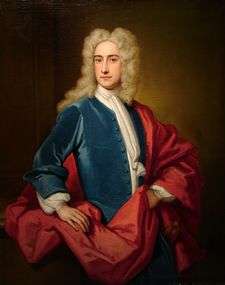Samuel Sandys, 1st Baron Sandys
| The Right Honourable The Lord Sandys PC | |
|---|---|
 | |
| Chancellor of the Exchequer | |
|
In office 12 February 1742 – 12 December 1743 | |
| Monarch | George II |
| Prime Minister |
The Earl of Wilmington Hon. Henry Pelham |
| Preceded by | Sir Robert Walpole |
| Succeeded by | Hon. Henry Pelham |
| Personal details | |
| Born | 10 August 1695 |
| Died |
21 April 1770 (aged 74) Highgate Hill |
| Nationality | British |
| Political party | Whig |
| Spouse(s) | Letitia Tipping |
Samuel Sandys, 1st Baron Sandys, PC (10 August 1695 – 21 April 1770) was a British politician in the 18th century. He held numerous posts in the government of the United Kingdom, namely Chancellor of the Exchequer, Leader of the House of Commons, Cofferer of the Household and First Lord of Trade. He was also a Justice in Eyre and Member of Parliament for Worcester and holder of the Sandys Barony. He was the son of Edwin Sandys, MP of Ombersley, Worcestershire – himself a descendant of Edwin Sandys, Archbishop of York. Baron Sandys married Letitia, eldest daughter and co-heiress of Sir Thomas Tipping, 1st Baronet. They had seven sons and the eldest, Edwin, inherited his title upon his death when his post chaise overturned on Highgate Hill.
Career
Mr. Sandys reached the peak of his parliamentary and political career in 1621. In the proceedings, on 10 Feb., Chamberlain numbered Sandya among the four ‘chief speakers’ of the Commons. He had an impressive track record. During the first sitting he made about 61 recorded speeches. He also received approximately 29 committee appointments, and was named to six conferences. On 5 Feb. he was nominated to the prestigious privileges committee and the sub-committee appointed by the committee of the whole House to draw up a petition to the king in defence of their liberties on February 5, 1621.
One of the unique qualities of Sandys is his unique ability to draft excellent petitions. On 12 February, he was asked to draft an excellent petition to the king defending the Commons’ right to freedom of speech. During this Parliament Sandys often contributed to debates on electoral disputes, but not always with authority, for on 7 Feb. he felt obliged to explain that he had not intended to oppose the examination of sheriffs’ returns in his speech on the Gatton dispute.
Family
- Edwin Sandys (28 April 1726 – 11 March 1797), 2nd Baron Sandys christened 14 May 1726 Ombersley, Worcs.
- Martin Sandys (c. November 1726 - 26 December 1768), christened 24 November 1726 Ombersley, Worcs. His daughter Mary inherited the estates upon the 2nd Baron's death in 1797 and was granted a new Barony with a special remainder to her younger sons in 1802.
References

Bibliography
- Cokayne, George E. (1896). "Sandys of Ombersley". Complete peerage of England, Scotland, Ireland, Great Britain and the United Kingdom, extant, extinct, or dormant. Vol. VII, S to T. George Bell & Sons. p. 54.
- Hanham, A. A. "Sandys, Samuel, first Baron Sandys of Ombersley (1695-1770)". Oxford Dictionary of National Biography (online ed.). Oxford University Press. doi:10.1093/ref:odnb/24652. (Subscription or UK public library membership required.)
- Horn, David Bayne; Ransome, Mary (1996). English Historical Documents 1714-1783. Volume 7. Routledge. ISBN 0-415-14372-1.
External links
| Parliament of Great Britain | ||
|---|---|---|
| Preceded by Samuel Swift Thomas Wylde |
Member of Parliament for Worcester 1718–1743 With: Thomas Wylde 1718–1727 Sir Richard Lane 1727–1734 Richard Lockwood 1734–1740 Thomas Winnington 1741–1743 |
Succeeded by Thomas Winnington Sir Henry Harpur, Bt |
| Political offices | ||
| Preceded by Sir Robert Walpole |
Chancellor of the Exchequer 1742 – 1743 |
Succeeded by Henry Pelham |
| Leader of the House of Commons 1742 – 1743 | ||
| Preceded by Thomas Winnington |
Cofferer of the Household 1744 |
Succeeded by Edmund Waller |
| Preceded by The Earl of Halifax |
First Lord of Trade 1761–1763 |
Succeeded by Charles Townshend |
| Legal offices | ||
| Preceded by The Duke of Leeds |
Justice in Eyre south of Trent 1756 |
Succeeded by The Earl of Breadalbane |
| Preceded by The Lord Edgcumbe |
Justice in Eyre north of Trent 1759–1761 |
Succeeded by The Duke of Leeds |
| Peerage of Great Britain | ||
| New creation | Baron Sandys 1743–1770 |
Succeeded by Edwin Sandys |
.svg.png)